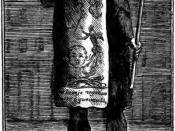Voltaire uses satire throughout his text in many ways. Many of which makes the reader question their morals on life and see a crud humorous episode that is degrading and unjust. Others find satire, such as Voltaire's hysterically funny. His inappropriate life stories of characters are almost predictable as the text continues. One after another, someone is humorously punished for their wrong doings. This humorous satire allows Candide to believe Pangloss' philosophy. But when Candide meets the slave in chapter nineteen, Voltaire does not use satire to describe his pain, but uses unjust punishment. After Candide's meeting with the slave, he questions Pangloss' beliefs on optimism.
Candide has based his life and thought on Pangloss, the great philosopher of optimism. Pangloss preaches that everything in life that happens, no matter the degree, is for the best. "'It is demonstrable,' he would say, 'that things cannot be other than as they are: for, since everything is made to serve an end, everything is necessarily for the best of ends'" (Voltaire 4).
Pangloss believes that there is no wrong doings in this world and that everything happens for a reason and will end up being for the best. When adversity is brought upon him, Candide simply dusts it off and goes on with a smile on his face, knowing that everything will be for the best.
One of the best examples of satire is displayed in a story told by the Old Woman. At this point of the story Candide strongly believes in Pangloss' philosophy, and the example of the old woman strongly supports it. As she goes through her troubled life, she explains that she was involved in an act of cannibalism. Some may find this horrifying, but the way Voltaire tells her story makes it humorous. "But the extremes of hunger to which they were reduced forced them to eat our two eunuchs⦠'cut off one buttock,' he said, "from each of these ladies, and you will be well provided for" (Voltaire 30). Even though the Old Woman went through a rough time in her life, it still comes off rather funny because it is unreal. Candide feels that the Old Woman did have a rough life, but does not affect Candide enough to banish his beliefs of optimism, unlike his encounter with the slave later in the text.
It is not until Candide and Cacambo reach the town of Surinam, that he visualizes life differently. The two stole upon a negro man that is lying on the ground barely clothed. Candide is astonished by the site and thinks to himself, why has this happened when this world is the best of all worlds. The slave tells his story which puts Candide in a state of silence. "When we work in the sugar-mills and get a finger caught in the machinery, they cut off the hand; but if we try to run away, they cut off a leg. I have found myself in both situations" (Voltaire 52). Candide finds this story totally different than the Old Lady's because he sees this as an actual happening rather than the Old Lady's story about cannibalism. One difference is that the Old Woman told a story that happened a while ago, and Candide can see that the Old Woman is doing well now. The slave on the other hand, is presently in pain and agony. Candide sees no good in the injustice brought on him. This is a very influential part of the text because Candide's beliefs about optimism have failed to be true. It proves that not everything is for the best. "'Oh, Pangloss!' cried Candide. 'This is one abomination you could not have anticipated, and I fear it has finally done for me: I am giving up on your Optimism after all'" (Voltaire 52). Voltaire's other forms of satire such as the Old Woman's story or Candide's conscription into the Bulgar army is rather comical and unreal. The slave told a story that was not exaggerated, and left no room for humor. Voltaire illustrates social injustice by bringing slavery into the story, which is very real, and for the first time in the text, Candide caves in to Voltaire's satire. Not only is it a first for Candide, but as a reader, we are not laughing at Voltaire's inappropriate ethics.
Although the Old Lady told a story that had negative aspects, Candide believes that Pangloss' teachings are correct because the old has become a strong person, and that there was a reason why she went through so much pain. When he comes across the slave of Surinam, he cannot see an optimistic future for this man because of his present state. The difference between these two examples of satire is clear when Candide swears off Pangloss' philosophical outlook.
Works CitedVoltaire. Candide or Optimism.New York: The Penguin Group 2005.






